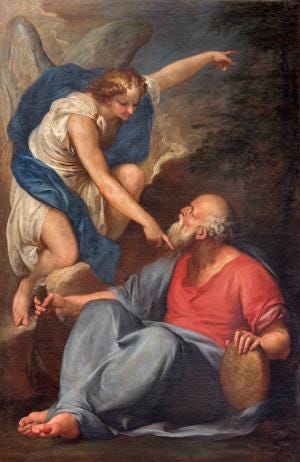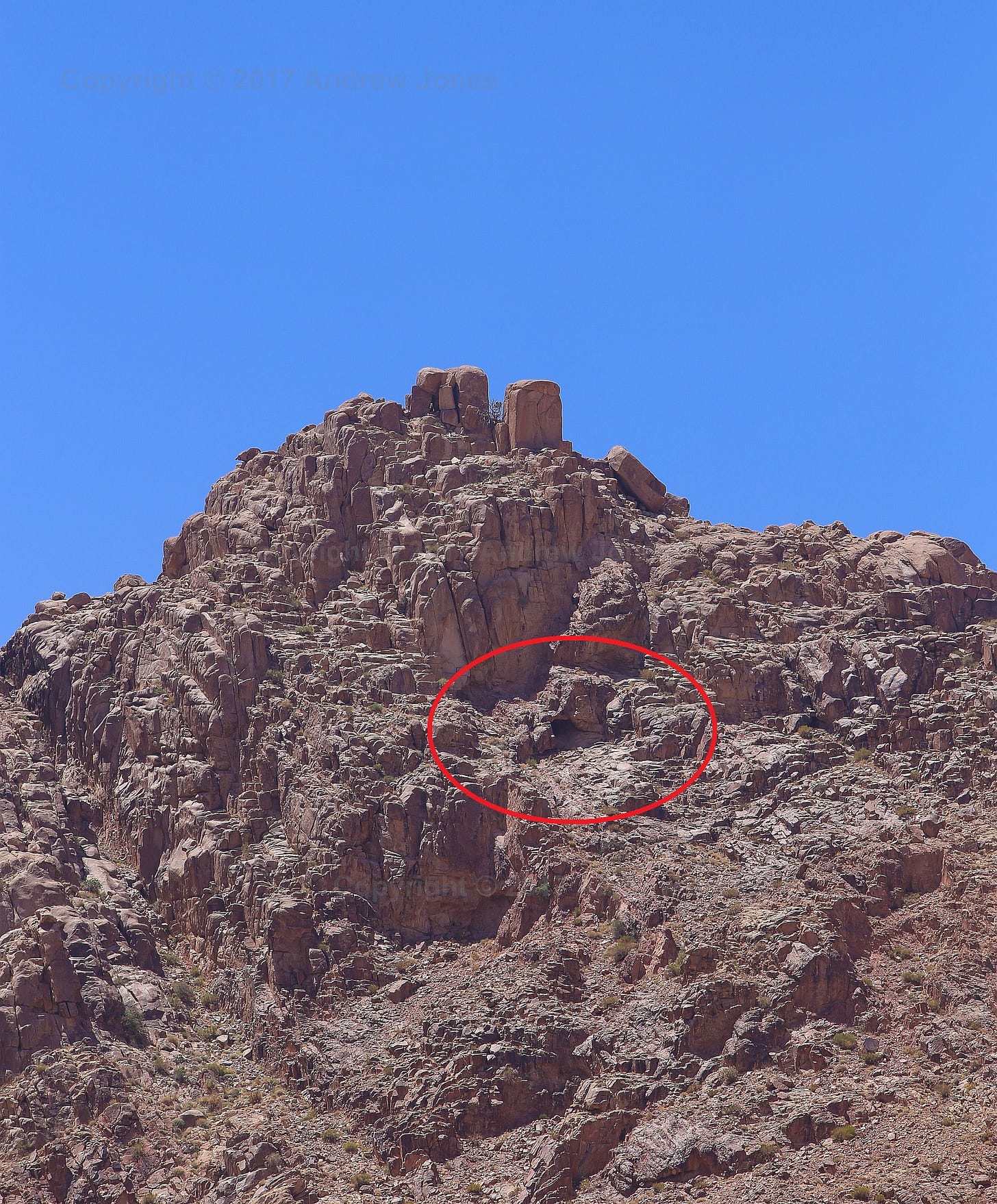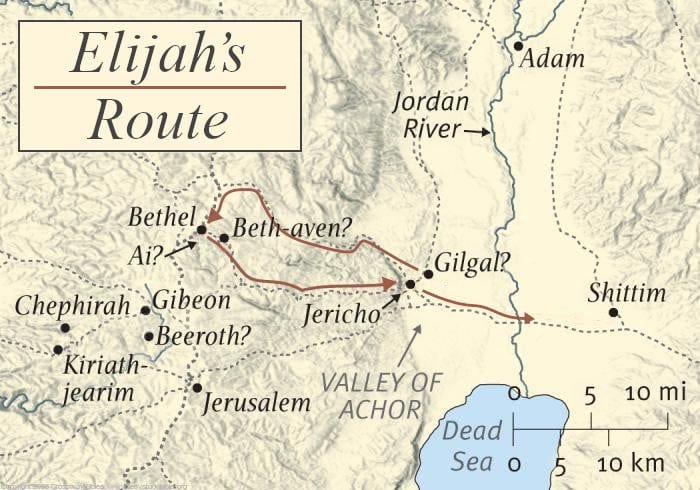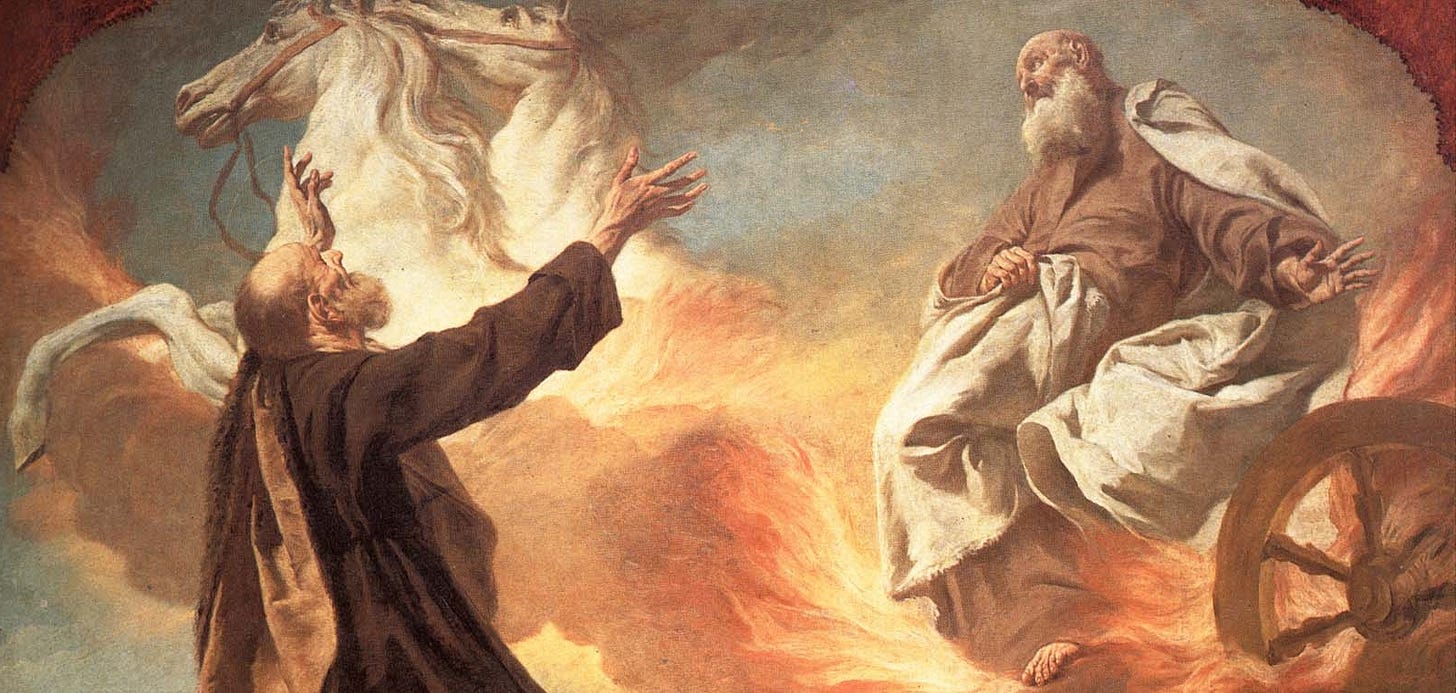THE JOURNEY TO HOEB
Elijah had left Beersheba in Judah and went to Mt. Horeb/Sinai in the Sinai Peninsula. He had eaten the food provided by the angels and on the strength of this supernatural food, he travelled for forty days to reach Mt. Horeb. The trip was to meet God face to face and to determine the direction for Elijah’s life and for the remaining portion of his ministry.
Many of us find ourselves in a similar position. We have become exhausted as we have lived our lives carrying out the direction that we believe that God has given us. Elijah had seen incredible miracles in his life. God had supplied his needs miraculously. Further, God had given him great victories over evil spiritual influences in Israel. The sacrifice of Elijah to God had been miraculously accepted at Mt. Carmel. Elijah had prayed for the drought in Israel to end after three years, and God had answered his prayers.
Despite all of this, Elijah was exhausted. Jezebel threatened to kill him. Further, Elijah believed that he was fighting this battle against evil with overwhelming odds against him and sometimes believed that he was the only one trying to do what God wanted.
Elijah needed to hear from God (don’t we all?). He also needed to know what God’s direction was for his ministry. Further, Elijah was ready to resign, to “hang up his shingle,” and even die in order to get relief from this never-ending battle. Elijah was depressed, burned out and needed a new vision from God “on the mountain top.”
Sometimes, we all need to meet God at special places. In this case, that special place was Mt. Horeb (Mt. Sinai).
ON THE MOUNTAIN TOP
Elijah came to Mount Sinai. He found a cave and lodged in it. We believe that this may have been the same cave that Moses had used when he was on Mount Sinai and got The Ten Commandments. The cave is noticeable from the ground. It is about 15 feet high, twenty feet deep and 20 feet wide. The height of the cave decreases from 15 feet in the front to only about 8 feet in the back. Below are a couple of photos showing the cave.
Cave of Moses and Elijah is circled in red.
Close-up view of Cave of Elijah
God asked Elijah why he had come. Elijah in 1 Kings 19 responded that he had come because he had been “jealous for the Lord,” but things had not gone well. The people had forsaken their covenant with God, pulled down altars, killed the prophets of God and only Elijah was left. God told Elijah to leave the cave and to go and stand on the Mount before God.
Elijah did as he was told. 1 Kings 19:11 says that the Lord “passed by.” First there was a great and strong wind, but God was not in the wind. There was a great earthquake, but God was not in the earthquake. Next came a fire, but God was not in the fire. Finally there was the sound of a low whisper and God again asked Elijah why he was there. Once again, Elijah repeated his answer that Israel had forsaken God and that he was the only one left and that the enemies of God were now trying to kill him.
In a way, we are like Elijah. We feel that we have done our best for God but things perhaps have not gone as well as we had hoped. We want God to deliver us from our enemies and we want deliverance NOW! Big time deliverance and success will not be refused by us either. It is time for some signs and miracles. A little fire from heaven to show that our sacrifices are appreciated would be fine and, by the way, if some of the evil people go up in smoke, that is OK too. We are tired and hurting and have experienced persecution and disappointment.
Despite all of that, God did not respond to Elijah in the big way that he had expected. Instead he heard that soft whisper saying “Why are you here?” The soft whispers of God are of much more value to us than the loud and flashy answers that we want and expect. Moses came to the mountain for some big time experiences. Instead, he got simple direction on the way to go and what to do.
Sometimes, God speaks to us with a quiet and soft voice instead with the loud and flashy answers we demand.
God, in effect, gave Elijah a precise direction and a transition plan. Elijah was to mentor a new prophet of God whose name was Elisha. He is also to install two new rulers, neither of whom will be a follower of God (surprisingly). Israel had forsaken God and unfortunately they will continue to experience the fruits of their rebellion against God. One ruler that Elijah is to anoint is Hazael who will be king over Syria. The other is Jehu who will be king over Israel. It is a case of “You want pagan rulers. Your desires are answered, you get pagan rulers.”
God also gave Elijah some encouragement. He told Elijah that he was not the only one who has followed God. In 1 Kings 19:18, God says: “Yet I will leave seven thousand in Israel, all the knees that have not bowed to Baal, and every mouth that has not “kissed him.””
Sometimes, an encounter with God brings us perspective. We happily learn that we are not in the battle alone.
GOD IS NOT THROUGH WITH US YET
Despite Elijah’s desire to take early retirement through death, God was not through with him. In fact, God had a sense of humor and denied his request for death altogether.
God had a plan for Elijah and Elijah carried it out. Elijah got a new prophetic assistant, who is named Elisha. Elijah anointed the leadership of Hazael and Jehu. He confronted Ahab when Ahab and Jezebel killed Naboth to steal his vineyard. Elijah even predicted the manner of death of Ahab and Jezebel.
During the same period, God raised up another prophet Macaiah, the son of Imlah, who became a mighty prophet and began to prophesy against Ahab.
The successor to Ahab was his son Ahaziah who fell through a lattice work in his upper room. Elijah who had predicted the deaths of Ahaziah’s parents (Ahab and Jezebel) also predicted the death of Ahaziah who was a Baal worshipper.
In short, despite Elijah’s desire to roll over and die, God had a plan and Elijah continued to move in great power as a prophet of God.
GOING OUT IN A BLAZE OF GLORY.
Elijah’s ministry was concluded in glory. He and his assistant prophet, Elisha, went from Gilgal, to Bethel, and to Jericho.
Map showing Bethel, Gilgal and Jericho.
If you recall, Moses had stood on Mt. Nebo just outside of Jericho and had surveyed the Promised Land before the people of Israel were led into it by Joshua (Jesus). When Joshua crossed over the Jordon, the waters of the Jordan were held back and Joshua and the people of Israel crossed over on dry land. Elijah is going in the opposite way. As he and Elisha cross the Jordon, Joshua rolls up his cloak and strikes the waters of the Jordan and the Jordan parts and they pass over on dry ground (2 Kings 2:8). The similarity with the account about Joshua is not accidental. God is still in charge.
The account of Elijah’s assumption into heaven is given in 2 Kings 2: 11-12 which states:
“And as they still went on and talked, behold chariots of fire and horses of fire separated the two of them. And Elijah went up by a whirlwind into heaven. And Elisha saw it and cried, “My father, my father! The chariots of Israel and horsemen!” And he saw him no more.”
Most commentators believe that Elijah rode the chariots of fire into heaven, but Scripture only says that he was carried into heaven by a whirlwind. Like me, you may wonder what all of this imagery about chariots of fire is about.
Elijah and the Chariot of Fire
People writing on this topic seem to believe that the chariot of fire and the horses of fire evidence the power of God. There is good reason to think that this is correct. Many believe that the purpose of the vision was to inspire Elisha and others that the power of God is mighty.
During the ministry of Elijah, fire had fallen and consumed the sacrifice built to God by Elijah in front of the Priests of Baal. On two occasions, Elijah had called down fire to consume soldiers who had come to capture him. The ministry of Elijah was a demonstration of the power of God over evil. When Elijah prayed, fire fell.
Chariots and horses of fire are imagery found elsewhere in the Bible. In 2 Kings 6:17, the servant of Elisha saw horses and chariots of fire surrounding Elijah to protect him.
In Isaiah 66:15 it says:
“Behold, the Lord will come in fire, and his chariots like the whirlwind to render His anger with fury and His rebuke with flames of fire.”
Some other verses are:
“Behold he goes up like clouds and his chariots like the whirlwind. His horses are swifter than eagles. Woe to us, for we are ruined.” (Jer. 4:13)
“The chariots of God are myriads, thousands upon thousands; The Lord is among them as at Sinai, in holiness.” (Ps. 68:17)
The chariots and horsemen of God illustrate power, strength and judgment.
The imagery is that if chariots and horses manifest power on earth, the power of God are flaming chariots and horses. God will return for his own and the world can not stand against the power of God.
Interestingly, some believe that the assumption of Elijah may illustrate the rapture of the living believers when Christ returns whereas Moses may represent the believers who have died in Christ.
Although this is speculation, Elijah’s prophetic ministry did not die with a quiet whimper. Instead the end of his ministry was glorious and full of power. Further, the prophetic ministry would continue under the great prophet Elisha. The prophetic mantle of Elijah fell to Elisha.
The lesson to us is that God knows when our time in a ministry, or even our life, is at an end. The end us often better than the beginning. Scripture says that “Precious is the death of his saints.” (Ps. 116:15). Ironically, Elijah, who had prayed to die did not die. Like Enoch, who walked with God, Elijah was taken up into heaven without death.
Finally, if you have given up on your ministry, your family, your church or your life, DON’T. Our God is a God of miracles and surprises. Have hope. Don’t give up. God is not through with you yet!








